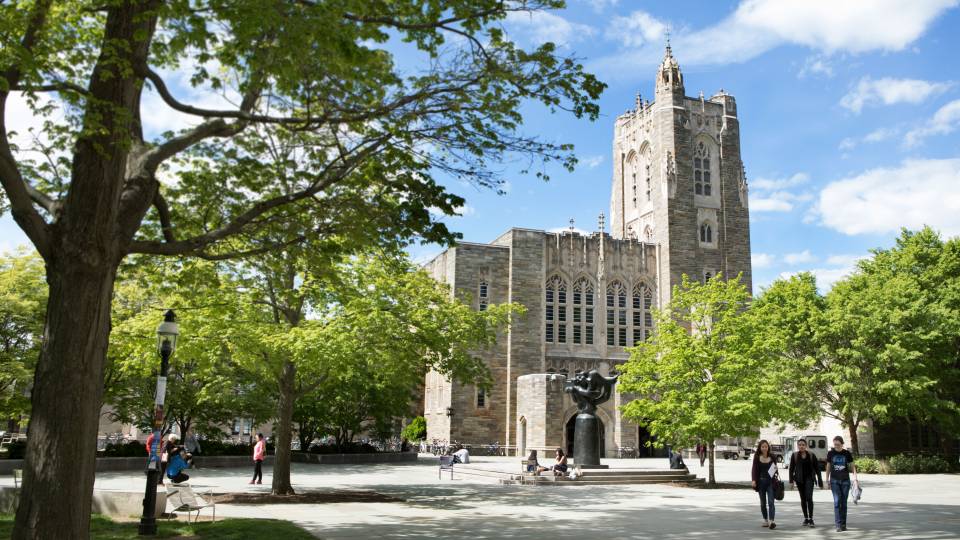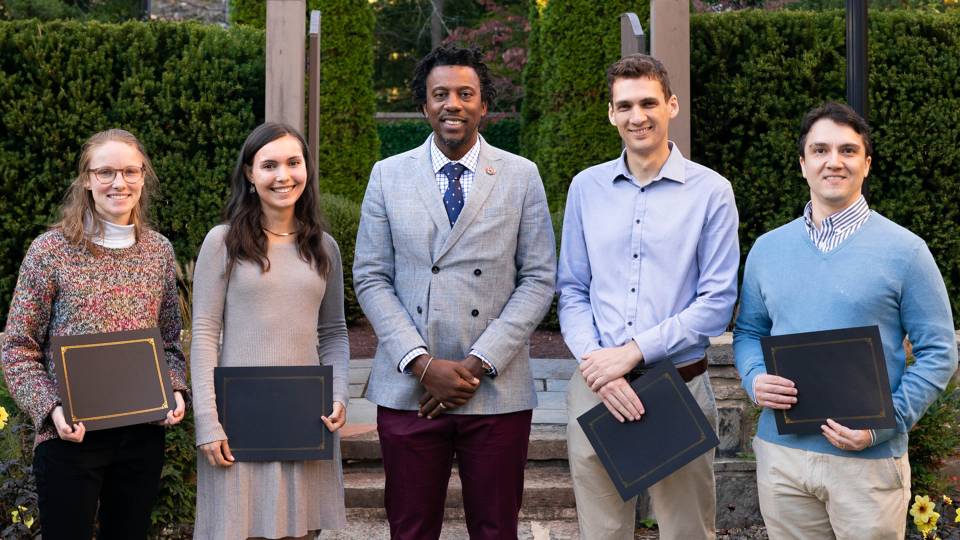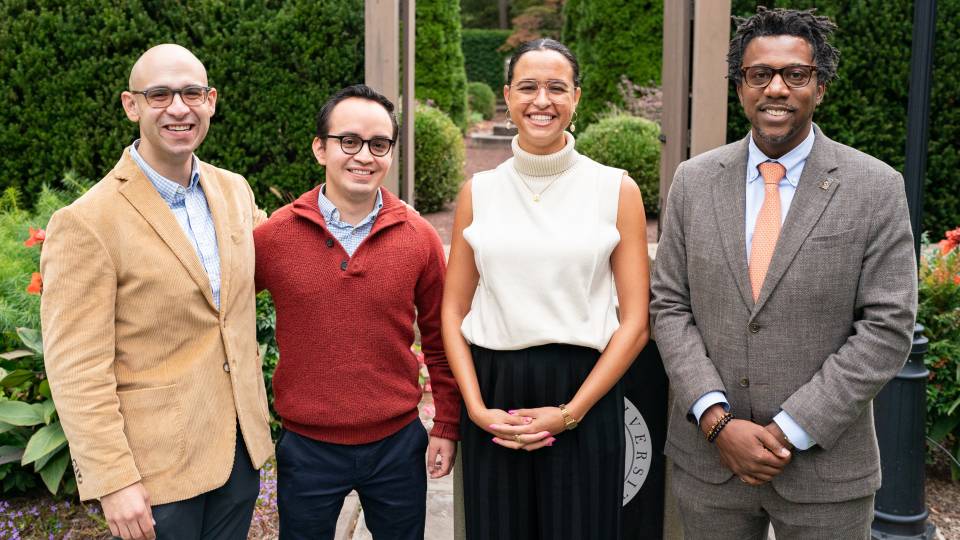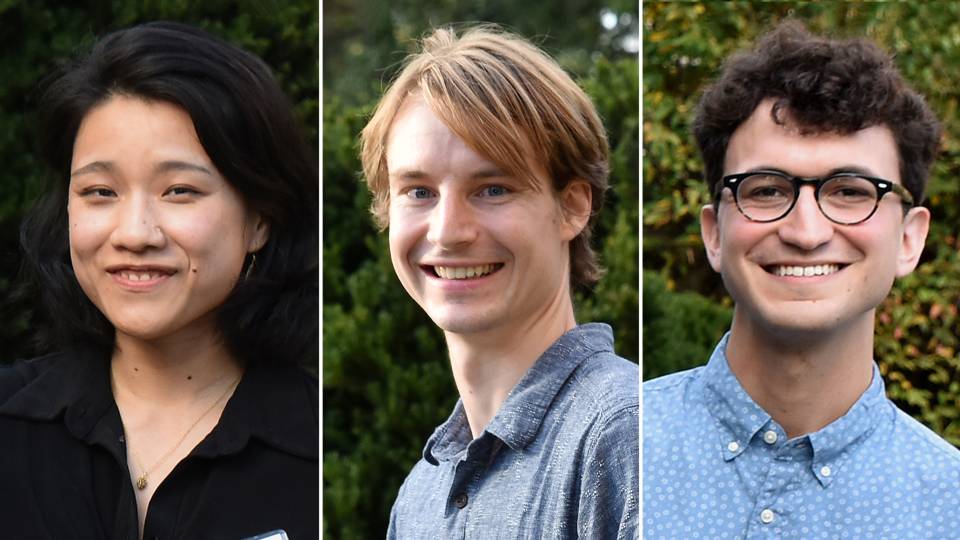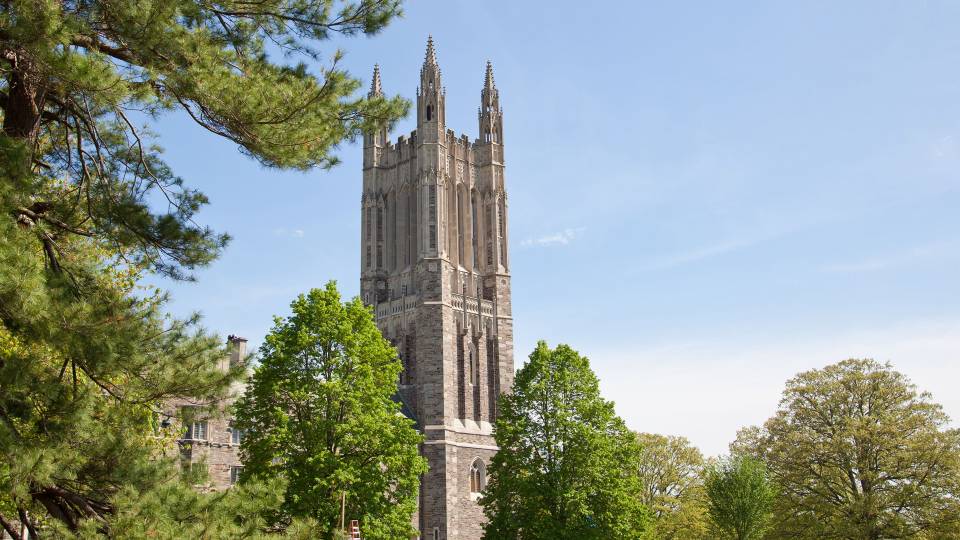Dean of the Graduate School Rodney Priestley (center) with Jacobus Fellows (from left) Pietro Cibinel, Rama Hagos, Zhiyi “Allen” Ren, and Tung Nguyen
Pietro Cibinel, Rama Hagos, Tung Nguyen, and Zhiyi “Allen” Ren have been named winners of the Porter Ogden Jacobus Fellowship, Princeton University’s top honor for graduate students.
The Jacobus Fellows will be honored at Alumni Day ceremonies on Saturday, Feb. 22.
Established in 1905, the fellowships support each winner's final year of study at Princeton. They are awarded to one Ph.D. student in each of the four divisions — humanities, social sciences, natural sciences, and engineering — whose work demonstrates the highest scholarly excellence.
Pietro Cibinel
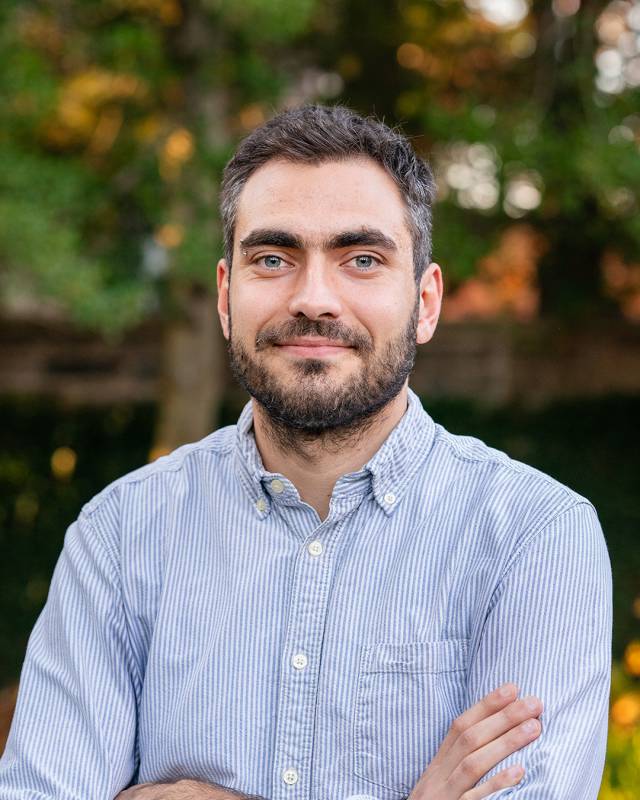
Pietro Cibinel
Cibinel, a fifth-year doctoral student in philosophy who came to Princeton in 2020, earned a bachelor of arts in philosophy from Lancaster University in England and a bachelor of philosophy from the University of Oxford.
His dissertation, “Individual Risks and Social Outcomes,” addresses the moral philosophy of how to distribute welfare in society. Cibinel’s answer relates this question to people’s willingness to take risks, and so has real-world implications for policymaking in areas of uncertainty, like climate change and medical ethics.
“The key questions that I'm interested in are normative questions about what we should do, how we should act; questions of moral philosophy,” Cibinel said. “How a policymaker should make decisions and what is rational for an individual to do in circumstances of uncertainty.”
Cibinel’s research stems from the late economist John Harsanyi’s social aggregation theorem.
“The real lesson of Harsanyi’s aggregation theorem, as I see it, is that to properly evaluate a state of affairs, we need to know more than how well-being is distributed among people,” he said. “The ethical significance of an individual ending up with a certain amount of well-being at least partly depends on that individual's attitude towards risk.”
Using formal tools, Cibinel has developed a “risk-priority view” in which the interests of the risk-averse take priority when resources are scarce, and those of the risk-loving are prioritized when resources are plentiful. His theoretical approach is interdisciplinary, at the intersection of ethics, normative economics, and social choice theory.
“I find it quite exciting to go to conferences where I can talk to an economist, and it seems like there's enough shared background that we can have meaningful and productive conversations,” Cibinel said.
The areas of normative ethics and decision theory that Cibinel works on also deal with policies that affect future generations.
“While it doesn't make sense to say that future people have an attitude to risk, we still need to make choices on their behalf,” said Cibinel. “And so the ethical question arises, how risky should we be on behalf of future people?”
During his time at Princeton, Cibinel has co-taught an undergraduate course in the Department of Philosophy and served on the department’s outreach committee during the 2022-23 academic year.
One of Cibinel’s advisers, Lara Buchak, professor of philosophy, noted how much of an asset he has been to the philosophy department during his five years at Princeton.
“Pietro is a model department citizen,” Buchak said. “One thing that struck me right away about Pietro is how interested he is in contributing to other people's projects. He’s often the first to jump in with questions or suggestions when somebody else makes a point.”
Jacob Nebel, professor of philosophy, said Cibinel’s work is “brimming with novel ideas, but always grounded in careful argumentation.”
In 2024, Cibinel was selected by Princeton’s University Center for Human Values as a Graduate Prize Fellow and, in 2023, as a Global Priorities Fellow by the Global Priorities Institute at the University of Oxford.
Rama Hagos
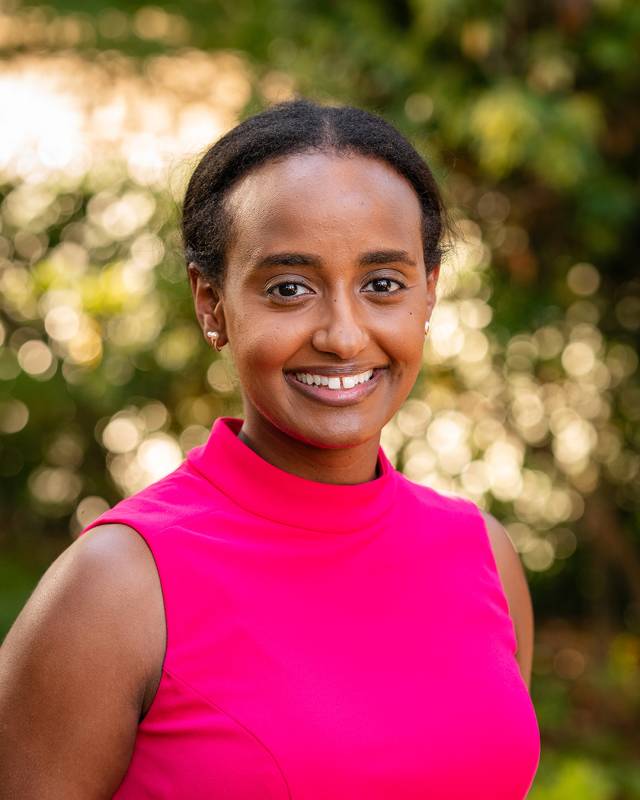
Rama Hagos
Hagos, a sixth-year doctoral student in sociology who came to Princeton in 2019, earned her bachelor’s degree in anthropology/sociology from Amherst College in 2015.
Her dissertation, “Historical and Contemporary Patterns of Social Stratification," draws on historical and contemporary data sources to examine differential integration patterns in the United States across various health, economic, and social outcomes. Hagos’ research expands the sociological understanding of immigrant integration by including women, internal migrants who moved north during the Great Migration, and Caribbean migrants who resided in New York City from the late 19th to the early 20th century — populations less examined in the existing literature.
“New York was such a significant destination for many migrants to the United States during this period,” Hagos observed. “However, the outcomes and experiences of certain migrant groups are not as well understood. My research provides a more comprehensive portrayal of social integration during the late 19th and early 20th centuries. By incorporating the experiences of a broader range of migrants, I can provide a more complete account of the factors shaping social integration and examine the extent to which the established theories of immigrant integration apply to different groups of immigrants.”
Hagos believes her work has not only broadened the scope of research but also challenged some of the fundamental answers found in the literature, leading to new perspectives on contemporary inequality. “A consistent effort to incorporate the experiences of women and migrants from various regions of the United States and around the world raises new questions about the factors contributing to different patterns of social integration,” she said. “Our foundational theories of integration were initially developed to understand one group but later applied to understand others. With the growing diversity of contemporary immigrants, there's an opportunity to understand how inequality varies among immigrants by place of origin, race and ethnicity, and time spent in the United States.”
Hagos’ research also examines the health of migrants. While scholars have long concentrated on the earning trajectories of migrants, perhaps more significant is how their health evolves after migration. “Understanding the varying health trajectories of migrants provides insight into the factors that contribute to changes in population health more broadly," Hagos said.
Princeton faculty who have worked with Hagos throughout her academic journey see qualities in her research and her approach as a student that have led to superb scholarship. “Her work showcases intellectual curiosity, bold exploration of new data and methods, and a steadfast commitment to rigor,” said Tod Hamilton, professor of sociology and Hagos’ dissertation adviser. “Rama possesses the essential qualities — depth of thought, dedication, and originality — needed to make a lasting impact on the discipline."
“What makes Rama so special as a student is the joy she derives from the research she undertakes and the findings she develops,” noted Doug Massey, Henry G. Bryant Professor of Sociology and Public Affairs.
During her time at Princeton, Hagos has co-authored four peer-reviewed journal articles and one book chapter. She also received a Prize Fellowship in the Social Sciences for 2022–24, the Marvin Bressler Graduate Student Teaching Award in the Department of Sociology in 2022, the William G. Bowen Merit Fellowship for 2021–22, and a President’s Fellowship for 2019–21.
Tung Nguyen
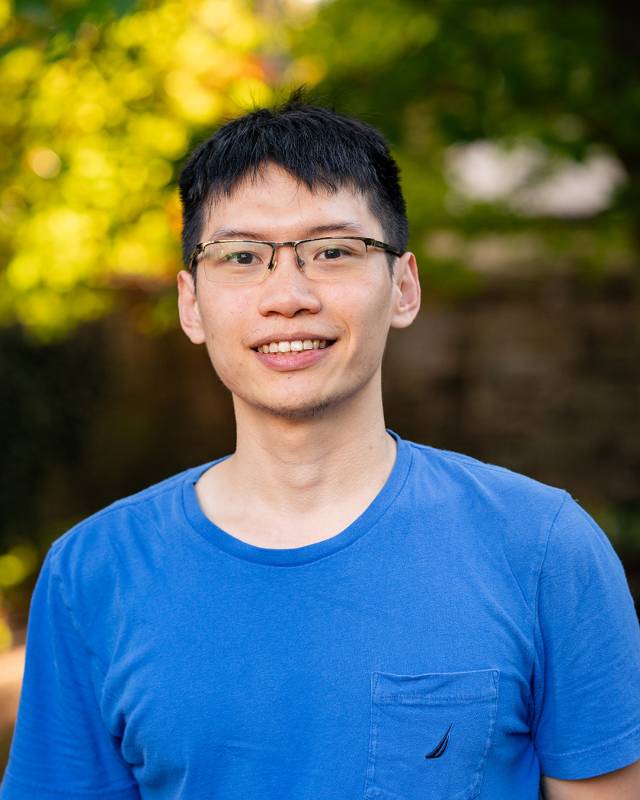
Tung Nguyen
Nguyen, a fifth-year doctoral student in applied and computational mathematics who came to Princeton in 2020, earned a bachelor’s degree in mathematical sciences from the Korea Advanced Institute of Science & Technology, Daejeon.
When Nguyen arrived at Princeton, he developed a simple research process: Fill a whiteboard with ideas, then think about the problems. His novel thoughts have led to significant breakthroughs that had long eluded scholars working on a central open problem in graph theory since the 1970s. His dissertation, "Induced Subgraph Density,” focuses on the local-global property in mathematics, specifically this phenomenon in graph theory. His research centers on the idea that complete disorder is impossible in any large system. He seeks to identify a coherent and ordered structure within a large system.
“One of the central open problems in my area is the Erdős–Hajnal conjecture from 1977,” Nguyen said. “It is a wonderful example of the local-global phenomenon in graph theory. It says that even as long as you impose just a tiny bit of local structure in your system, something global is going to happen.”
Nguyen’s research centers on “enormous graphs,” which he examines to see if they might contain a little graph. If identified, he examines whether the little graph might have specific patterns. He hopes this research can improve the efficiency of real-world algorithms that transmit information between two computers in a large system, overcoming obstacles by identifying them and understanding the system's structure.
“The main reason that we want to improve the function is because we want to find new methods of controlling very large systems,” Nguyen said. “We want to understand more about the structure of the large system. If you can understand how this large system behaves, there will be a chance that you can design a very efficient way to connect two arbitrary points in the system.”
His adviser, Paul Seymour, the Albert Baldwin Dod Professor of Mathematics, credits Nguyen with significant breakthroughs in their research of local-global graph theory.
“Tung worked by himself and would come back a couple of days later saying, ‘I think I can do this,’ which he obviously couldn't do because it would be way too great a thing if he could do that,” Seymour said. “So, we'd check it, and five or six times, he was right. He could do this thing that was way beyond what we hoped.”
In addition to his research, Nguyen has assisted in teaching six courses during his time at Princeton. Over the past five years, he has given 20 invited talks and a five-lecture minicourse around the world to present his research.
Nguyen hopes to stay in academia for the rest of his career, continuing as a postdoc before pursuing a position as a tenured professor in a university mathematics department.
Zhiyi “Allen” Ren

Zhiyi “Allen” Ren
Ren, a sixth-year doctoral student in mechanical and aerospace engineering, earned a bachelor’s degree in mechanical engineering with a minor in mathematics and an M.S.E. in robotics, both from Johns Hopkins University.
Robots have great potential to help humans with everyday tasks around the home, but can humans trust robots to assist them safely and reliably? With that fundamental question, Ren’s dissertation, “Generalizable Robot Learning with Formal Assurances,” focuses on designing algorithms that teach robots to understand what humans mean, to learn about and adapt to new environments and tasks, and to know when they don’t know so they will ask for clarity before proceeding.
Collaborating with colleagues in the computer science and electrical engineering departments and with industry entities, Ren looks at lessons learned from fields like machine learning and natural language processing to determine how robots can be trained through data. Over the past decade, there has been an explosion of interest in using data-driven methods in robotics, but these methods have run into challenges. Ren's unique approach to tackling these challenges using techniques from other fields is showing promise.
Ren explains, “How can we teach a robot to learn a human’s habits and way of speaking? We took a fair amount of data from the human, and with the algorithm we proposed, the robot can come up with some kind of understanding of what the human means in general.
“A similar idea has been applied in machine learning,” Ren said. “But we're really the first people to think about this in the context of robotics.”
Ren’s research also hopes to teach robots to be proactive in completing everyday tasks.
“Another part of my research has been thinking about how we can have robots explore by themselves in the environment, trying out different things as humans give feedback. Based on this feedback, the robot can learn to better complete the tasks instructed by humans in the environment.”
“Both of these types of research — calibrating the robot’s understanding with human preferences, and letting robots self-explore diverse environments and improve — will make the robots achieve very high reliability while building trust between the robots and humans,” Ren said. “I really think there's a huge societal impact in the long run with these robots.”
Ren has been incredibly productive as a graduate student, publishing 15 papers, with two more under review. His dissertation adviser, Anirudha Majumdar, associate professor of mechanical and aerospace engineering, notes that Ren’s “insatiable curiosity” has driven his success at Princeton.
“He's collaborated with industry entities like Google DeepMind and Toyota Research Institute, people at Nvidia,” Majumdar said. “Many of these [collaborations] were completely initiated by him. I think that's a testament to his curiosity. He is not satisfied just working on one little piece of the robotics puzzle, but he wants to see how everything fits together and get a sense of the breadth of the challenges in robotics.”
After graduating, Ren plans to join a top industry research team and continue working on his long-term vision of pushing the boundary of robot capabilities to improve everyday lives.
Advancement Communications contributed to this story.

